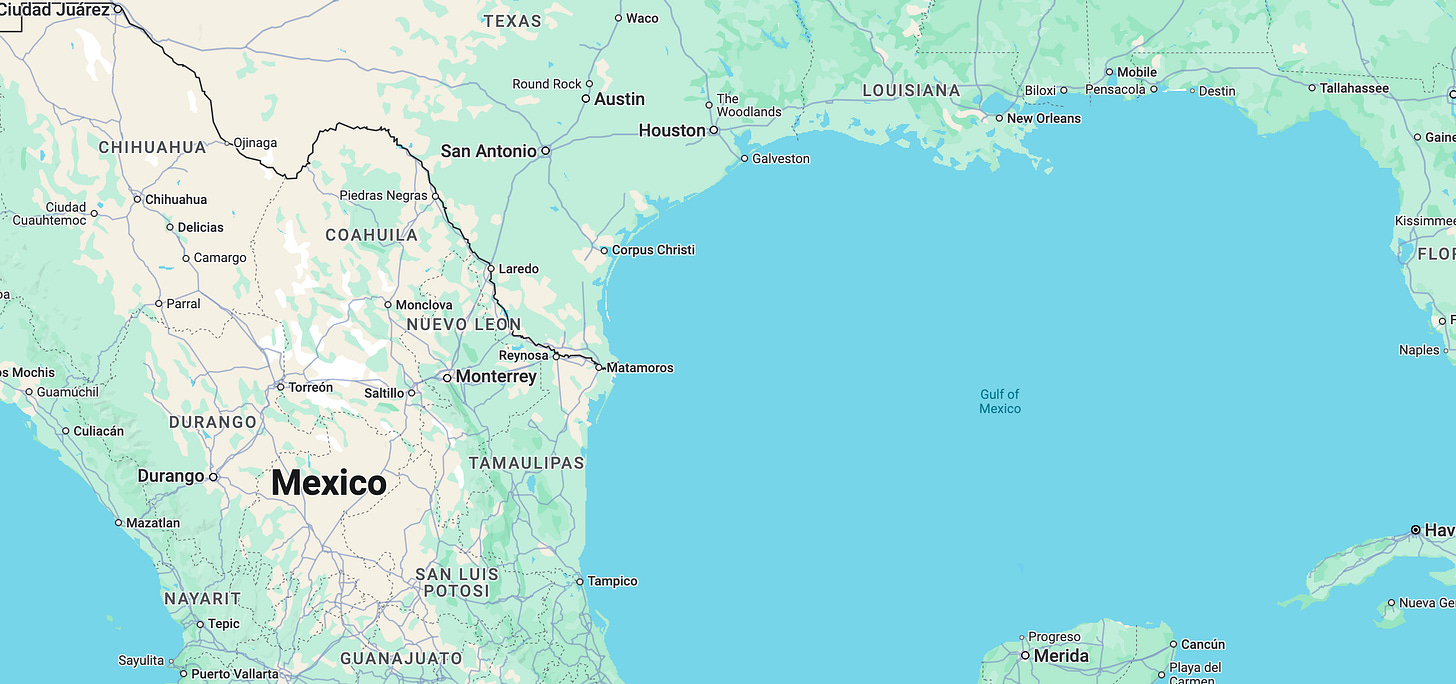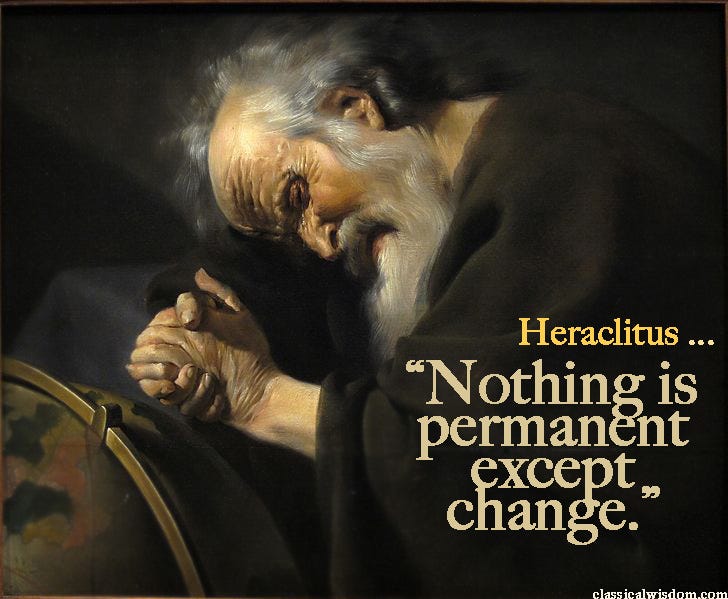What’s in a name?
Is Re-labeling a distraction or disruption?
Dear Classical Wisdom Reader,
Politicians love making noise, grabbing the attention of the people and securing headline status with outlandish moves. These showcasing tactics and passion stirring directives, from the ancient world onwards, can be more or less harmless... a purposeful distraction while they are doing something... else.
Other times, it’s not.
Determining whether the populace is being wronged or entertained is a difficult job, one that requires taking a step back, using our rationale and putting the new initiative through the ringer of philosophical discourse and inquiry.
And so it’s with that preamble that I would like to ponder the recent news north of the Rio grande; the American president, Donald Trump, has taken to anointing geographical features with new names, like the Gulf of Mexico becoming the Gulf of America... or Mount Denali alternating to Mount McKinley.
Now, I’m not proposing we get into the specifics of the highs and lows, the ins and outs of American topography. At this moment, I’m not concerned with the detailed past of these exact features or their politics.
Instead, I want to ask a more profound question, one eloquently described by Shakespeare in that balcony scene, “That which we call a rose, By any other name would smell as sweet."
I'd like to discuss what is in a name...
The ancients, not surprisingly, had plenty to say on the topic. In Cratylus, Plato explores whether names are natural (intrinsically linked to the essence of things) or conventional (arbitrarily assigned). Aristotle rejected the possibility of a name’s inherent connection to its meaning, instead casting labels as mere conventional symbols representing concepts in the mind.
The pre-Socratic philosophers also had their say. Heraclitus proposed that language, like the world, is in constant flux, resulting in the fluidity of meaning and reality. Protagoras, famously known for his “Man is the measure of all things” epigram, likewise felt that truth depends on human perception...While Parmenides argued for a fixed reality, suggesting that language and names must correspond to an eternal, unchanging truth.
Later philosophers, like Saint Augustine and Bertrand Russell, also delved into the discussion. Indeed, whether it's Locke arguing that names are arbitrary or Aquinas opining that they reveal God’s essence, it’s a contentious question that has occupied many a great mind... even to this very day... and, it appears, especially with regards to geography.
Modern Atlas enthusiasts will no doubt comment on the slew of international conflicts and tensions that are neatly demonstrated in alternate names: The Iranians (as well as most of the world) refer to their nearby body of water as the Persian Gulf, while the Saudis and Emiratis maintain that it is the Arabian Gulf. In a sea farther East, the Japanese mark their maps with the Sea of Japan, while Koreans label the same waters at the East Sea. Over in Europe, the Chunnel crosses the Channel for the Brits and La Manche (the Sleeve) for the French.
To this the Classicist will (once more), rejoin with the historical examples. The song-inspiring history of Istanbul (no, Constantinople) regularly reveals who is in power at what time. Modern conflicts can have ancient contentions… For instance, it was the Roman Emperor Hadrian who renamed Judea, a term used by the Israelites, Babylonians, and Greeks, to Syria-Palaestina after the Jewish revolts against Rome (66–135 CE) in an explicit act of political suppression.
More comically, the ancient Greeks called the Black Sea Pontus Axeinos (Πόντος Ἄξεινος, "Inhospitable Sea")... before they colonized it and renamed it Pontus Euxinus (Πόντος Εὔξεινος, "Hospitable Sea").
Of course I could go on with myriad examples, from Hellespont to the Euphrates to The Caspian Sea / Hyrcanian Sea...but just because there are historical cases, doesn’t mean changing a name is either inherently good or bad, it only proves it’s nothing new.
So, with this broad historical perspective, we ask again: what is in a name?
Is it simply petty political tiffs and opportunities to assert egos? Or is it a deeply instrumental manner upon which to turn the course of history? Is it a distraction or a disruption?
As always, you can reply to this email or write to me directly at anya@classicalwisdom.com and I’ll post your responses in a future mailbag.
In the meantime, we have an extremely thought provoking selection from a past question: Can one philosophy be sufficient? Should we be consistent or eclectic when it comes to philosophical schools of thought? And can we be both?
Read on and consider your own philosophical leanings, below.
All the best,
Anya Leonard
Founder and Director
Classical Wisdom
***Classical Wisdom Members, this week you can enjoy our newest Podcast with Professor Joel Christensen, as he discusses The Biology of Epics. What can viruses, DNA and parasites teach us about the Great Myths? Much more than you can imagine…
Monday Mailbag
Re: Can one philosophy be sufficient?
I am approaching my 80th birthday, an engineer by degree and profession, and a student of philosophy for the past 15 years. There is not one recognized philosopher I have studied with whom I agree unconditionally. My special interest is morality and ethics. My own ethical decision-tree process includes pragmatism (for practicality), existentialism (for personal responsibility), moral realism, Kant's CI, Ross' 7 Duties, Aristotle's moral virtues and mean of moderation, Rawls' Reflective Equilibrium, and Act Utilitarianism.
One may ask, "What is not included?" My answer, "Most of what I observe and read in my current graduate studies."
Regards,
Tom O'C., Graduate Student, author
-
Greetings Anya!
I read a quote some time ago, the source of which I can't remember: "There are few things more persuasive than a mind that has mastered its own perspective." The statement reads true. In order for this mastery to happen fully, one needs to stay the course with one philosophical school.
The same can be said with regard to religion. It's more difficult to become a saint or a yogi or a bodhisattva if you're bouncing between traditions. On this subject it should be remembered that philosophy is a practice of mind and an engagement of life - the Western equivalent of Eastern yoga. It has degraded over time regrettably to a mere academic deconstruction of concepts (hence the unStoic "shouting" in a website's comments section).
While persuasion in philosophical delivery is what we want, what we don't want is sophistry. Mastering only one philosophy might yield persuasiveness, but the ultimate end is to arrive at truth and a life worth living. For this, the eclectic way is in order. All truths and ideas partake of interconnection such that mastery of any one requires familiarity with all others (or as many as possible in a lifetime). The discovery of connections will never cease along this path.
Can one philosophy be sufficient? No. But we should attempt to master at least one.
Should we be philosophically eclectic? Absolutely! Mastery of one requires familiarity with many.
Can we be both? Quod erat demonstrandum!
Have a good day!
Luke
Anya,
I think eclecticism is the only way to deal with our changing perception of a changing reality.
Brooks K.
-
It seems to me that each has some truth in it, but none will stretch to cover the entire universe.
I.e.: the blind men and the elephant sort of thing…..
Mediane
-
It's literally an assault of retardism on pretty much the entirety of social media, mostly because of the prevalence of bots.
There are quite simply, more stupid and worthless people on the internet, and in greater frequency, than smart people... who probably have jobs.
This is compounded daily by the amount of bots, and reposts... also, that the youth use AI more frequently, and are on the internet more frequently.
Totally agree with you.
Sincerely,
Andrew B.
Philosophy is the wisdom of man and that is utter foolishness to God. So the answer is a resounding no. Since it is insufficient then choosing which form or combination is an exercise in futility.
Philosophy does play a role underneath God’s Word. Consistent philosophy drives a person to conformity. Eclectic drives the person to creativity and initiative. Both are equally important and there are endless flavors expanding in man by the various mixtures of the two. So yes, a person has some of both usually with one being more dominant than the other.
Charles F.
-
The appeal of 'one philosophy' is undeniable. We can answer questions like "How to live?" finally and with authority. With one philosophy grounding the discipline, then the school of philosophy can rise up to the level of a science like Biology. Its domain would be established and its teaching would be easily consumable. I understand the appeal but also want to say that this defeats the purpose of philosophy.
An eclectic whole philosophy may seem like a madhouse. And it is. But the multitude of differences produced by the madhouse of philosophy is not meant to be loud chattering and white noise. Rather the constant debate of philosophy is the friction proper to thinking. It is what gives the margins a voice, and what destabilizes the authority of a singular voice. Simply put philosophy, even though all thinkers fall under the umbrella term, is not one way to think but a discipline that promotes new thinking to come.
Let us consider this from another angle. One philosophy to rule them all produces one single story. The same story with a finite amount of mutations. One philosophy would be incapable of thinking about the uniqueness of the present. Modernity would have to be reduced to the time the one philosophy was written. Anything new has to be supplemented to the same.
The madhouse of philosophy produces a narrative that is always already in flux. There is no one story but rather differences with a more or less full account of the world.
Alex S.





My main thought on 'what's in a name" was what would the message to the world be if we changed the name to "The Welcoming Golf" versus what does the name America imply today?
Is it a distraction or a disruption? Excellent question! And the answer will certainly depend on who you ask.